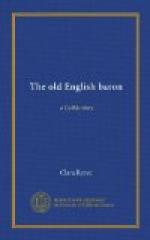Sir Philip applied to Lord Fitz-Owen, who begged leave to be silent. “I have nothing,” said he, “to offer in favour of this bad man; and I cannot propose harsher measures with so near a relation.”
Zadisky then begged to be heard.
“You can no longer have any reliance upon the word of a man who has forfeited all pretensions to honour and sincerity. I have long wished to revisit once more my native country, and to enquire after some very dear friends I left there. I will undertake to convey this man to a very distant part of the world, where it will be out of his power to do further mischief, and free his relations from an ungrateful charge, unless you should rather chuse to bring him to punishment here.”
Lord Clifford approved of the proposal; Lord Fitz-Owen remained silent, but shewed no marks of disapprobation.
Sir Philip objected to parting with his friend; but Zadisky assured him he had particular reasons for returning to the Holy Land, of which he should be judge hereafter. Sir Philip desired the Lord Fitz-Owen to give him his company to the criminal’s apartment, saying, “We will have one more conversation with him, and that shall decide his fate.”
They found him silent and sullen, and he refused to answer their questions.
Sir Philip then bespoke him: “After the proofs you have given of your falsehood and insincerity, we can no longer have any reliance upon you, nor faith in your fulfilling the conditions of our agreement; I will, therefore, once more make you a proposal that shall still leave you indebted to our clemency. You shall banish yourself from England for ever, and go in pilgrimage to the Holy Land, with such companions as we shall appoint; or, secondly, you shall enter directly into a monastery, and there be shut up for life; or, thirdly, if you refuse both these offers, I will go directly to court, throw myself at the feet of my Sovereign, relate the whole story of your wicked life and actions, and demand vengeance on your head. The King is too good and pious to let such villany go unpunished; he will bring you to public shame and punishment; and be you assured, if I begin this prosecution, I will pursue it to the utmost. I appeal to your worthy brother for the justice of my proceeding. I reason no more with you, I only declare my resolution. I wait your answer one hour, and the next I put in execution whatever you shall oblige me to determine.”
So saying, they retired, and left him to reflect and to resolve. At the expiration of the hour they sent Zadisky to receive his answer; he insinuated to him the generosity and charity of Sir Philip and the Lords, and the certainty of their resolutions, and begged him to take care what answer he returned, for that his fate depended on it. He kept silent several minutes, resentment and despair were painted on his visage. At length he spoke:—
“Tell my proud enemies that I prefer banishment to death, infamy, or a life of solitude.”




